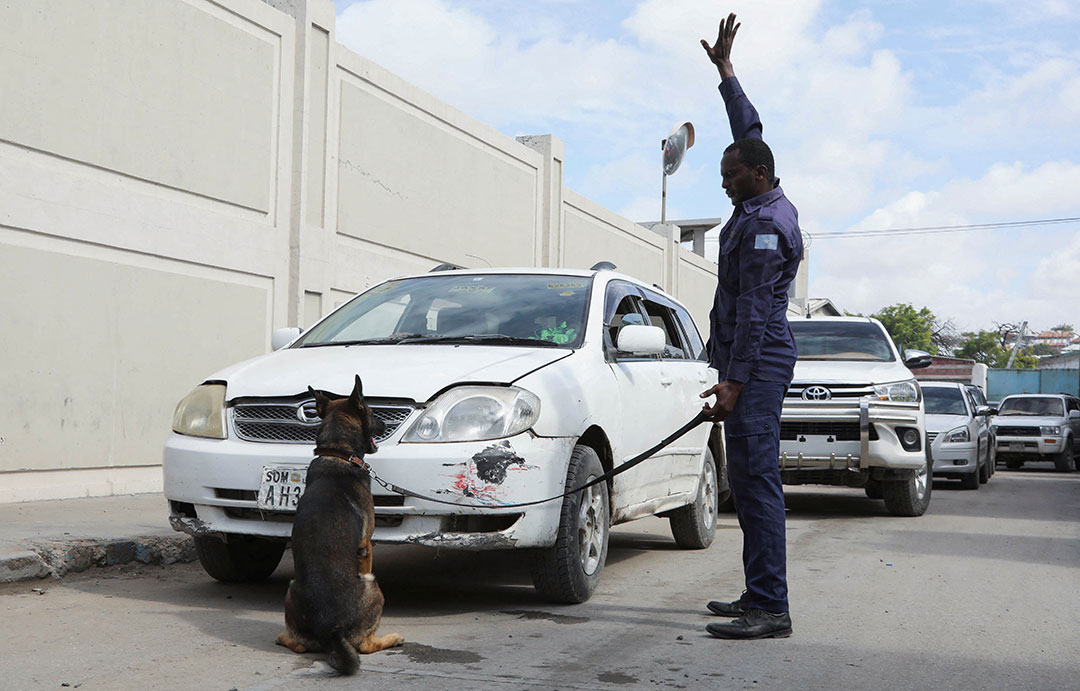As Somali Troops Expand Control, al-Shabaab Increases IED Attacks
ADF STAFF
For more than a decade, improvised explosive devices have been the deadliest weapons terrorists in Somalia have deployed against both Soldiers and civilians.
Since 2014, IEDs planted by al-Shabaab have killed or injured more than 14,000 people, 61% of them civilians, according to Action on Armed Violence. Based in the United Kingdom, the group tracks armed violence against civilians around the world.
Over the last year alone, IEDs have killed or injured 1,500 Somalis, most of them civilians.
Al-Shabaab bombed a café in Mogadishu in July and a tea shop in central Somalia in August. On September 27, bombings killed six people and injured 10 in Mogadishu and in the Middle Shabelle region. The Mogadishu blast involved an explosives-rigged car near the National Theatre, about 1 kilometer from the president’s office.
Buloburde, the site of the tea shop bombing, hosts a base for the African Union’s peacekeeping operation and has been a frequent target for IED attacks in recent years. Civilians have suffered the most from the bombings, which primarily have targeted restaurants, hotels and military posts frequented by Soldiers with the Somali National Army (SNA) and government leaders.
As the SNA drives al-Shabaab from sections of central and southern Somalia, the terrorist group has increased its bombing campaign in retaliation. In 2023, more than 820 SNA Soldiers were killed or wounded, most of them by IEDs.
SNA Col. Faisal Ali Noor told the U.N. that Soldiers have been injured by IEDs while responding to earlier explosions.
“At times, IEDs detonated while we were digging, resulting in casualties,” Col. Noor said. “Due to our limited knowledge, we even resorted to lighting fires to defuse the IEDs, which led to further fatalities.”
As the SNA expands its control over more areas of the country, experts say, the military needs more Soldiers with the skills to locate and remove IEDs. In recent years, the United Nations Mine Action Service (UNMAS) has trained 46 Somali explosive ordnance disposal teams. In September, the U.N. launched a monthlong “train the trainer” program that will enable the SNA to build more disposal teams.
“This course marks a significant milestone with Somali trainers for the first time training Somali students, ensuring sustainability for the SNA in responding to the threat posed by explosive hazards to communities across the country,” said Fran O’Grady, chief of UNMAS in Somalia, in a U.N. statement.
Since 2020, the SNA has expanded its ability to counter the threat from IEDs with help from training, mentoring, and specialized equipment provided by UNMAS.
The increase in IED attacks has accompanied an increase in homemade explosives built from easily obtained components that enter Somalia through its ports or are smuggled in from Yemen just across the Red Sea.
“We know the devastating impact they [IEDs] have on Somali communities,” James Swan, the U.N.’s acting representative to Somalia, told attendees at the “train the trainer” event. “And we also know that the primary targets are your fellow soldiers in the SNA. So, its crucially important that a solution be found to address this threat.”
As Somalia adds to its corps of trained bomb disposal experts, troops will continue to face threats from al-Shabaab as SNA forces expand their area of control.
“We encounter numerous dangers, including enemy blockades and remote-controlled IEDs,” SNA Lt. Col. Mohamed Mohamud Awale told Africa News. “We have lost many comrades.”

